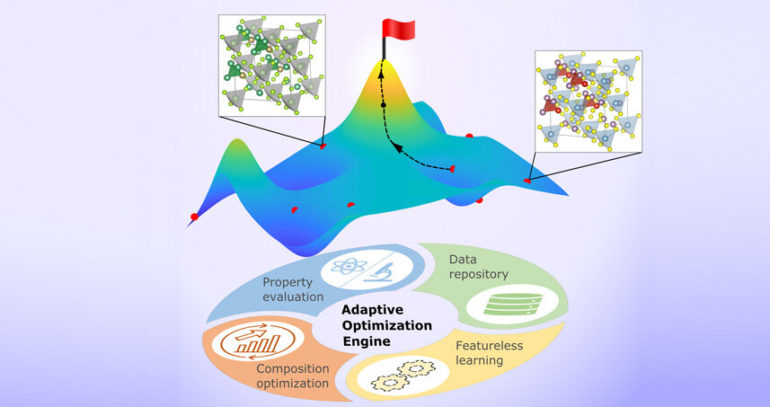Northwestern University researchers have developed a new computational approach to accelerate the design of materials exhibiting metal-insulator transitions (MIT), a rare class of electronic materials that have shown potential to jumpstart future design and delivery of faster microelectronics and quantum information systems—foundational technologies behind Internet of Things devices and large-scale data centers that power how humans work and interact with others.
The new strategy, a collaboration between Professors James Rondinelli and Wei Chen, integrated techniques from statistical inference, optimization theory, and computational materials physics. The approach combines multi-objective Bayesian optimization with latent-variable Gaussian processes to optimize ideal features in a family of MIT materials called complex lacunar spinels.
When researchers search for new materials, they typically look in places where existing data on similar materials already exists. The design of many classes of materials properties have been accelerated in existing works with data-driven methods aided by high-throughput data generation coupled with methods like machine learning.
Such approaches, however, have not been available for MIT materials, categorized by their ability to reversibly switch between electrically conducting and insulating states. Most MIT models are constructed to describe a single material, making generation of the models often challenging. At the same time, conventional machine learning methods have shown limited predictive capability because of the absence of available data, making the design of new MIT materials difficult.
“Researchers understand how to distill information from large materials datasets where it exists and when suitable features are available,” said Rondinelli, professor of materials science and engineering and the Morris E. Fine Professor in Materials and Manufacturing at the McCormick School of Engineering, and corresponding author of the study. “But what do you do when you don’t have large datasets or the necessary features? Our work disrupts this status quo by building predicative and explorative models without requiring large datasets or features starting from a small dataset.”
A paper describing the work, titled “Featureless Adaptive Optimization Accelerates Functional Electronic Materials Design,” was published on November 6 in the journal Applied Physics Review.
The research team’s method, called advanced optimization engine (AOE), bypasses traditional machine learning-based discovery models by using a latent variable Gaussian process modeling approach, which only requires the chemical compositions of materials to discern their optimum nature. This allowed the Bayesian optimization-based AOE to efficiently search for materials with optimal band gap (electrical resistivity/conductivity) tunability and thermal stability (synthesizability)—two defining features for useful materials.
To validate their approach, the team analyzed hundreds of chemical combinations using density function theory-based simulations and found 12 previously unidentified compositions of complex lacunar spinels that showed optimal functionality and synthesizability. These MIT materials are known to host unique spin textures, a necessary feature to power the future Internet of Things and other resource-intensive technologies.
“This advance overcomes traditional limitations imposed by chemical intuition-based materials designs,” said Chen, Wilson-Cook Professor in Engineering Design and professor and chair of mechanical engineering, and a co-author on the study. “By reframing functional materials design as an optimization problem, we have not only found a solution to the challenge of working with limited data, but also demonstrated the ability to efficiently discover optimal new materials for future electronics.”
While the researchers tested their method on inorganic materials, they believe the approach can also be applied to organic materials, such as the design of protein sequences in biomaterials or monomer sequences in polymeric materials. The model also offers guidance on making better decisions toward the optimal design of materials by choosing ideal candidate compounds to simulate.
“Our method paves the way forward for optimization of multiple properties and the co-design of complex multifunctional materials where prior data and knowledge is sparse,” Rondinelli said.
Work on this study was born from a project exploring Bayesian optimization in materials discovery within the Predictive Science and Engineering Design (PSED) interdisciplinary cluster program sponsored by The Graduate School at Northwestern. It was supported by funding from the National Science Foundation and the Advanced Research Projects Agency—Energy’s (ARPA-E) DIFFERENTIATE program, which seeks to use emerging AI technologies to tackle major energy and environmental challenges.
“This work highlights the impact of the collaborative PSED interdisciplinary design cluster,” Chen said. “It also emphasizes the crucial advances occurring in AI and machine learning at Northwestern in design and optimization.”
Novel material switches between electrically conducting and insulating states
More information:
Yiqun Wang et al, Featureless adaptive optimization accelerates functional electronic materials design, Applied Physics Reviews (2020). DOI: 10.1063/5.0018811
Provided by
Northwestern University
Citation:
New approach determines optimal materials designs with minimal data (2020, November 6)
retrieved 7 November 2020
from https://phys.org/news/2020-11-approach-optimal-materials-minimal.html
This document is subject to copyright. Apart from any fair dealing for the purpose of private study or research, no
part may be reproduced without the written permission. The content is provided for information purposes only.



